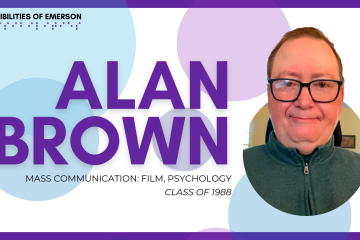Mona Bushnell is a staff writer for Tom’s IT Pro, Business.com, and Business News Daily and an Emerson alum having graduated in 2008 with a B.A. in Writing, Literature, and Publishing. She’s also a firm believer in the idea of having diverse professional experiences throughout your career, encouraging students to consider opportunities that may stem beyond more traditional routes.
Jessica Chance spoke with Mona a while back to learn more about her background in tech and the words of wisdom she had to share with current students.

Mona Bushnell ’08
What are some of the misconceptions that writers may have about working in tech?
“One major career misconception many writers have is that the industry dictates the type of work you do, and what your daily life is like, when really the role you have within your industry is far more important. For example, many young writers imagine working at high-profile publications or publishing houses because they love books and writing, but they don’t really think about what the day-to-day is like in those industries, or how supply and demand affects the type of compensation and freedom they’ll be allowed.
I think many writers probably assume my job is rigid, boring, and filled with corporate bureaucracy, purely because it’s business and technology related, but that’s not at all the case. In fact, because I found a niche in an underserved market I can be selective about my employment options and negotiate for what I want. Almost all my working hours are devoted to writing and researching, and I never deal with busywork or long pointless meetings. I am constantly learning new things, I don’t have to dress up, I can often work remotely and set my own rates, and the people I work with are generally smart, friendly, and low drama. Plus, I get to attend fun events and preview innovative technology before it’s available to the public, which is a great perk!”
Unintuitive as it seems, I get to do more of what I love (and less of what I don’t like) as a tech writer than I ever would have if I’d gone down a more traditional path.”
Tell us a little about your learning curve when you began at Purch.
“When I get a new job, or take on a new client, the first thing I like to get a handle on is the process for receiving assignments and submitting work. The learning curve at Purch wasn’t steep, primarily because I came into the job with a substantial amount of writing experience, but also because there was a pretty clear workflow in place for Staff Writers.
The onboarding process varies depending on the type of client and the scope of the work I’m doing for them, but in general I never like to be corrected on the same thing twice, so when I start a new job I try to immediately adapt to any relevant internal style manuals, policies, and processes.”
You wrote an article that was published on Business News Daily about adding tech skills to resumes. What was the impetus for putting that together?
“Pitching story ideas is a big part of being a Staff Writer at Purch. I came up with this pitch after reading an article about people going back to school to switch career paths. I started thinking about how different my job trajectory (and financial trajectory) would have been if I had gone back to school after undergrad instead of using all the free and cheap learning resources I had at my disposal. That train of thought gave me the idea to write an article for Business News Daily’s readership about learning tech skills that are highly transferable.
As a mostly self-taught tech writer, promoting lifelong learning and inexpensive online resources is something I’m passionate about. I genuinely believe that if you have an internet connection and a little motivation you can learn pretty much anything, and I like to highlight that fact as often as possible.”
Are there opportunities to still be creative when working for a tech company?
“Of course. I pitch most of my own story topics, I craft the metrics I use to test products, I write commentary on trends, I review solutions and make recommendations, and I get to interview people and write op-ed pieces. I have also done my fair share of non-tech related writing. I recently interviewed actor Ken Hall from People of Earth for Space.com (also a Purch property), and my freelance copywriting clients have ranged from law firms and financial services companies to restaurant chains and high-end jewelry designers. Just because I’m qualified to write about business technology doesn’t mean it’s all I’m allowed to pursue!”
Innovation, Entrepreneurship, Creativity are words in heavy rotation these days in both the creative and technical worlds, and of course at Emerson. What are the ways in which these industries can work more closely together?
“In my experience, innovation, entrepreneurship, and creativity are already inextricably linked in the professional world. The issue is less about promoting collaboration within industries and more about preparing students for a workforce that’s rapidly changing. For example, there are currently more remote and contract employees than ever before in U.S. history, and it is highly likely that there will be more contractors than full-time employees within the next ten years. This shift in the American workforce highlights the importance of professional intersectionality, especially for people who are self-employed, as many Emerson grads will surely be.
I think encouraging students to have jobs and interests outside of their majors, making it easier for them to pursue (and get credit for) diverse internships and work experiences, and providing courses on business basics, like negotiating, accounting, and invoicing, would go a long way towards preparing Emerson grads for the modern workforce.”


